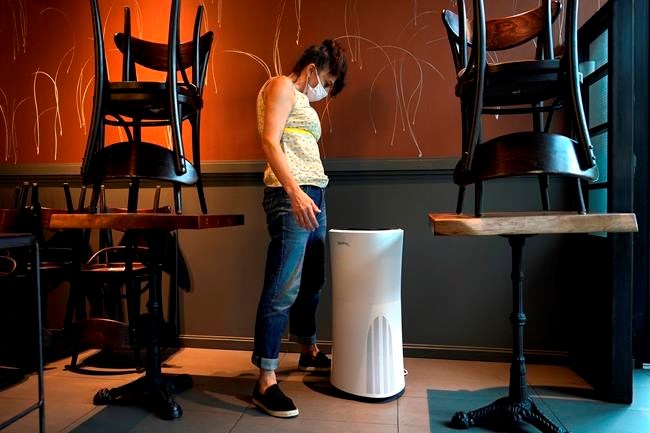TORONTO — The spread of smoke from wildfires across Canada in recent weeks has prompted an uptick in demand for air purifiers, as manufacturers and distributors say it appears Canadians are increasingly looking for ways to keep the air in their homes or workplaces clean.
Pollutants from wildfires in Ontario and Quebec have coloured skies grey and orange in cities such as Toronto and Ottawa this week, while wildfires in Alberta set a spring record last month and led to a state of emergency that has since been lifted.
Nick Coleman, dealer-owner at Leitrim Home Hardware Building Centre in Ottawa, said customers have been purchasing purifiers as well as furnace filters for additional air quality control.
“Air purifiers have been flying off the shelves," he said in an email. "Customers are requesting purifiers for all room sizes, specifically ones with high HEPA filtration.”
Mario Angeloni, director at Reliance Home Comfort, said the air quality of a sealed house is typically three to four times worse than outside, but smoky conditions outdoors means more people are retreating indoors where they're trying to create cleaner air.
The company has received 50 per cent more information requests than usual for air quality products this week, said Angeloni.
"Whereas before it was 'go outside and get some fresh air' rather than the air pollutants, now it becomes even more, 'I really need these products in my house.'"
Air purifiers made up 11 of Amazon Canada's top 50 bestsellers in the home products category on Thursday.
Mathias Karlsson, director of Home Smart for Ikea Canada, said the furniture giant has seen similar trends.
"This past week we’ve noticed increased demand in all markets impacted by wildfire smoke," Karlsson said in a statement.
"The Greater Toronto Area and Ottawa have seen the largest number of purchases, followed by an uptick in Halifax, Alberta, and British Columbia."
Meanwhile, companies such as Home Depot and Rona said they were also seeing more sales of purifiers and filters in certain markets.
Kelsey Hei, a senior application engineer at 3M, said people often don't realize the level of pollution in their homes until it becomes more visible due to an event such as a wildfire.
She said air filtration products have become more commonplace in recent years due to the increased prevalence of smoky conditions in some regions.
"We've definitely seen within the week a surge in demand," said Hei.
"A lot of people are what we call air unaware. They're not people that think about what's in their air until maybe something like this and so it kind of brings it to the forefront and people start to think about it and realize, 'oh, I need something to help clean the air."
Dyson Canada said it also saw a spike in interest from consumers for its air purification technology this week, with orders peaking on Tuesday and Wednesday when air quality in Toronto was rated at "high risk" levels
As campfire-like smells permeate outdoors, Canadians are also increasingly turning to products that help monitor pollution in their homes, said Erlend Bolle, chief product officer at Airthings.
"We always see an uptick of interest in our products during wildfire outbreaks. I would say this is no exception," he said.
The company's air quality monitor product known as Airthings View Plus, available in Canada at stores such as Best Buy and Canadian Tire, monitors for changes in pollutant levels and issues alerts when mitigation is needed. Bolle said that can inform people if they are exposing themselves to serious health risks.
"Even though the general recommendation is to stay indoors, it doesn't mean that they're safe," said Bolle. "They should understand … if they are being exposed to too high levels of particulate matter, if they should take any actions."
This report by The Canadian Press was first published June 8, 2023.
Sammy Hudes, The Canadian Press




